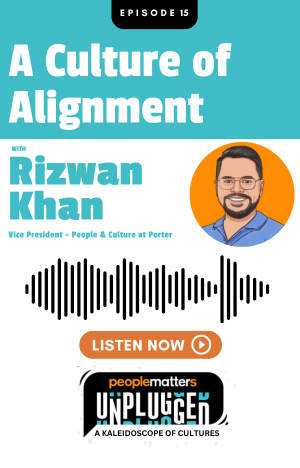Reimagine tech for business growth & people's development in Indonesia: Muhammad Shodiq

Indonesia is set to be one of the largest economies of the world but there are challenges in different spheres and sectors, with technology adoption and penetration, learning, skills development, organisational culture, change management and career management. Muhammad Shodiq, who has been a champion in the learning and development space in the banking industry shares valuable insights on what can leaders do to create inclusive, diverse and an equal future of work, while aligning tech, culture, business goals and people’s development and transformation.
In an exclusive interview ahead of People Matters TechHR Pulse Indonesia, where he will be a speaker in a fireside chat on ‘Making Learning Stick In 2023’, he speaks about the ground realities and how Bank CIMB Niaga is working at different levels to elevate the employee experience and empower its people.
Excerpts from the interview:
We understand that technological advances have pushed leaders to design a future that is different from what they envisioned. Can you tell us how you are reimagining business to achieve organisational goals as well as the goals set for the country?
Technological advancement through increased adoption of new and frontier technologies and digital access are expected to drive job growth. The Fourth Industrial Revolution has accelerated the pace of adoption of technologies and shifted the frontier between humans and machines across sectors and geographies. Understanding how technologies will impact labour markets is crucial for determining whether people will be able to transition from declining occupations to the jobs of tomorrow.
To achieve organisational goals in this context, it is crucial to embrace technological advances and utilise them to reimagine various aspects of the business. Here are some strategies to consider:
- Embrace Digital Transformation: Incorporate technology into core business processes to streamline operations, enhance productivity, and improve customer experiences.
- Foster a Culture of Innovation: Encourage employees to think creatively and explore new ways to solve problems. Emphasise continuous learning, experimentation, and collaboration to drive innovation within the organisation.
- Invest in Talent & Skills Development: We need to ensure our employees have the necessary skills to leverage technology effectively. Provide training programs and resources to upskill or reskill existing staff, as well as hiring individuals with expertise in emerging technologies.
- Leverage Data for Insights: Collect and analyse data to gain meaningful insights into customer behaviour, market trends, and internal operations. Use these insights to make informed decisions, optimise processes, and identify opportunities for growth.
- Collaborate with Technology Partners: Engage with external partners, such as technology vendors and startups, to leverage their expertise and access new technologies. This can help accelerate innovation and provide access to specialised skills and resources.
- Enhance Customer Experience: Leverage technology to personalise interactions, improve self-service options, and create seamless experiences across different channels.This will help attract and retain customers and increase overall satisfaction.
- Prioritise Cybersecurity: As technology becomes more integrated into the business, it is vital to prioritise cybersecurity. Implement robust security measures, regularly update systems, and educate employees on best practices to protect sensitive information.
By reimagining business through technology, leaders can transform their organisations into more adaptable, resilient, and successful entities. Remember to regularly evaluate and adjust strategies to stay aligned with evolving technological advancements and market trends.
Technology adoption and penetration has always been a challenge in Indonesia. How can organisations and leaders reimagine tech with the advent of artificial intelligence? How are you overcoming this challenge at your organisation?
Global banks have invested heavily in their next-gen capabilities to embrace the digital finance business model. AI applications have been doubling every three to four months. Cloud platform is forecasted to grow 16% with 40% failure rate. Embedded CRM functionality is on the rise. Indeed, technology adoption and penetration has always been a challenge in Indonesia.
However, with the advent of artificial intelligence (AI), there are opportunities for organisations and leaders to reimagine tech and overcome those challenges. Here are some initiatives to overcome such challenges:
- Raise Awareness: Leaders can organise awareness campaigns and educational initiatives to increase understanding of AI technology and its potential benefits.
- Collaborate with AI Experts: Organisations can partner with AI experts, research institutions, or AI service providers to understand how AI can be applied to their specific industry or sector.
- Develop Local AI Talent: Organisations can work with educational institutions to develop AI-focused programs and courses that help nurture local talent. By nurturing local talent, organisations can overcome the shortage of AI professionals and support the growth of the AI ecosystem in Indonesia.
- Government Support in Policy Framework: Leaders can advocate for government policies and frameworks that support AI development and adoption. This includes creating regulations that facilitate data sharing for AI applications, promoting AI research and development, and providing incentives for organisations to invest in AI technologies.
- Start Small, Scale Gradually: Implementation of AI can be overwhelming, especially for organisations with limited resources. Leaders can start with smaller AI projects, which allows organisations to gain confidence and experience before scaling up to more complex AI implementations.
- Foster a Culture of Learning: Leaders should create an environment that encourages experimentation and learning from failures. AI adoption might involve trial and error, so leaders need to support a culture where employees feel comfortable exploring new technologies and learning from their experiences.
By exploring these strategies, organisations and leaders in Indonesia can reimagine tech with the advent of AI. Overcoming the challenges of technology adoption and penetration will require collaboration, education, and the gradual implementation of AI solutions tailored to the specific needs of each organisation.
We all understand that culture plays a key role in attraction, retention and empowerment of talent. How are you reimagining culture to create global talent pools? What are some innovative ways adopted by your organisation to elevate employee experience, where people are happy, motivated and productive at work?
To create global talent pools, organisations are reimagining culture in innovative ways to attract, retain, and empower talent from diverse backgrounds. Here's how:
- Embrace Diversity & Inclusion: Organisations are actively promoting diversity and creating inclusive environments that value and celebrate differences. By fostering a diverse workforce, companies can tap into a wider talent pool and benefit from diverse perspectives, ideas, and experiences.
- Remote & Flexible Work Options: With the evolution of technology, organisations are increasingly embracing remote work and flexible work arrangements. This allows companies to tap into talent from different regions and time zones, widening their global talent pool. At CIMB Niaga, the ‘Hybrid Working Arrangement’ or ‘HyWork’ has been implemented since November 2021 for employees to work from home or office based on the type of employee's job, taking into consideration the employee's relationship with banking operations, the need for document access, and access to internal systems.
- Build a Global Mindset: Organisations are cultivating a global mindset among employees, encouraging them to embrace diverse perspectives, collaborate across cultures, and seek global opportunities. Our organisation has implemented Cross-Border Talent Mobility by giving employees opportunities to grow through short-term assignments to different functions or units both domestically and abroad.
- Leverage Tech for Communication, Collaboration: CIMB Niaga began exploring learning methodologies that can provide learning experiences that are easier, safer, and more targeted using Virtual Reality (VR) technology in order to improve the learning experience. The application of VR technology is based on real scenarios and can be done on a large scale without requiring employees to come to the training location. This learning innovation in the field of VR received appreciation from the Indonesian Record Museum (MURI) as the first Bank in Indonesia to implement VR Learning.
- Prioritise Employee Wellbeing: Companies are reimagining their work cultures to create inclusive environments where employees feel valued, appreciated, and empowered. This can involve fostering open communication, promoting work-life balance, recognising achievements, and providing opportunities for employee feedback and input in decision-making processes. By caring for the wellbeing of their global talent, organisations can create an environment that attracts and retains top performers.
Niaga's committed to providing the best experience for employees through a new way of working that is flexible yet effective in increasing productivity, collaboration, and relations among employees. Several initiatives include HySpace (co-working space facility), HyLearn (hybrid learning media), HyTalks (talk show series), HyTeam (platform for collaboration to increase employee engagement), HyLink (employee liaison and innovation platform) and HyFit (forum for improving physical, spiritual, and mental health) have been implemented.
With new skills set to dominate the next decade, how are you reimagining yourself to evolve with the future? What new skills are you looking to master to stay integral in the human-machine collaboration era?
Here are some insights on the new skills that we can consider mastering to stay integral in the human-machine collaboration era:
- Digital Literacy: In a rapidly evolving tech landscape, it is important to have a foundational understanding of emerging technologies such as artificial intelligence, data analytics, machine learning, robotics, and automation. This includes being aware of their capabilities, limitations, and potential applications in different industries.
- Data Literacy: With the rise of big data and analytics, individuals need to develop skills in collecting, analysing, and interpreting data. This includes understanding data trends, visualising data, and drawing meaningful insights to drive decision-making.
- Critical Thinking & Problem-Solving: As machines take over routine tasks, human workers will be required to engage in complex problem-solving and critical thinking, which involves the ability to analyse information, make sound judgments, think creatively, and come up with innovative solutions.
- Adaptability & Agility: The future of work is expected to be dynamic and constantly evolving. Being adaptable to change, open to learning new things, and comfortable with uncertainty will be essential skills to navigate the human-machine collaboration era.
- Emotional Intelligence & Interpersonal Skills: While machines can perform many technical tasks, the ability to connect with people, empathise, and collaborate effectively will continue to be valuable. Skills like leadership, communication, teamwork, and conflict resolution will still be in demand.
By focusing on these skills, individuals can position themselves for success and stay integral in the era of human-machine collaboration, where humans and machines work hand in hand to complement each other's strengths.
With Indonesia set to be among the largest economies in the world, tell us what’s been working well for you and what you think should change to achieve an inclusive, diverse and equal future of work?
To achieve a future-fit workforce in Indonesia, several aspects should be considered. While there are certain things that have been working well, there are also areas that require attention and change. Here are some key aspects leaders need to focus on:
- Strengthening Educational Systems: The Indonesian government and stakeholders can invest in improving the quality and access to education, especially in rural and remote areas. Enhancing vocational training and digital skills development programs can equip individuals with the necessary skills to thrive in the future of work.
- Ensuring Social Protection: Implementing robust social protection policies is crucial to support workers in the face of changing work dynamics. This includes social safety nets, unemployment benefits, and healthcare coverage, especially for informal and gig economy workers.
- Embracing Tech & Innovation: By embracing technology, Indonesia can foster innovation and create new job opportunities. Encouraging entrepreneurship, supporting startups, and promoting digital transformation across industries can drive economic growth and job creation.
- Addressing Skills Mismatch: There should be a focus on bridging the gap between education and industry requirements. Strengthening the collaboration between educational institutions, industry players, and the government can help align educational programs with the needs of the job market.
- Encouraging Inclusive Policies: Policies promoting diversity and inclusivity, such as non-discrimination in hiring and workplace policies, can create a more equal and inclusive work environment. Employers can be incentivised to adopt inclusive practices through policy frameworks.
- Building Sustainable & Resilient Industries: Promoting sustainable practices and green initiatives can create jobs in renewable energy, environmental conservation, and other sectors. This could contribute to building a sustainable and resilient future of work.
- Enhancing Social Dialogue: Engaging in social dialogue involving government, employers, trade unions, and civil society organisations can help address workers' rights, ensure fair working conditions, and provide a platform for stakeholders to collaborate on shaping the future of work.
By focusing on these areas, Indonesia can work towards an inclusive, diverse, and equal future of work, where everyone has access to opportunities and benefits from the country's economic growth.
While Muhammad Shodiq has shared his insights about new initiatives that organisations can take up to bring Indonesia at par with the ‘great places to work’, if you wish to meet him in person and have a conversation around technology and Gen AI’s role in upskilling and learning, join us at People Matters TechHR Pulse Indonesia on November 22 at JW Marriott, Jakarta. Register now!













